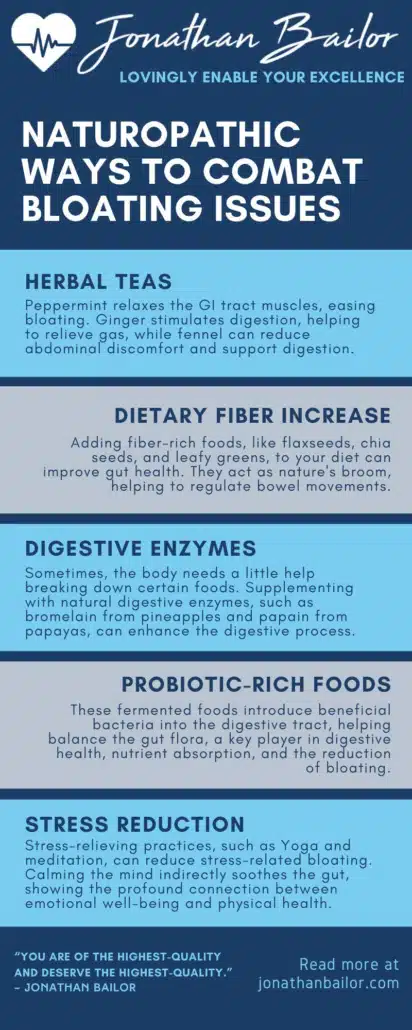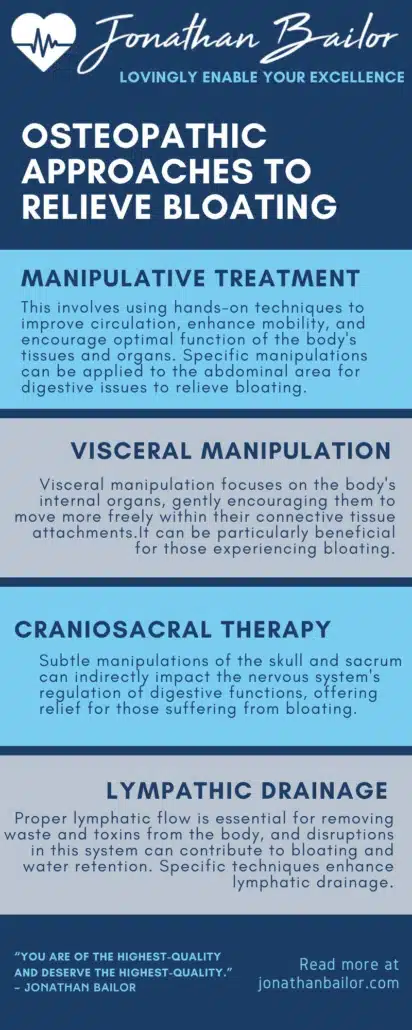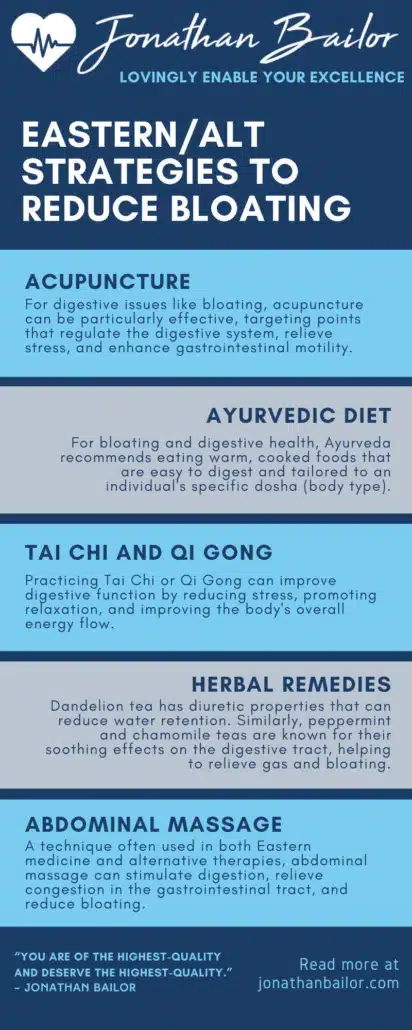19 Evidence-Based Treatments to Reduce Bloating and Boost Gut Health
Feeling bloated is more than an inconvenience; it’s a cry from your gut, seeking attention and care. In this Gut Health Guide with Jonathan Bailor, you’ll discover a variety of easy, proven ways to reduce bloating and boost gut health.
In a world brimming with quick fixes and instant gratification, the journey to gut health appears daunting, yet it’s profoundly rooted in nature’s wisdom. It’s not about the latest diet craze or a fleeting trend but about embracing timeless, evidence-based treatments that honor your body’s innate intelligence.
This exploration into gut health isn’t just another list of do’s and don’ts. It’s a heartfelt invitation to reconnect with your body, listen, and respond to its needs with kindness and understanding. Imagine transforming your digestive wellness not with harsh interventions but through gentle, natural remedies that have stood the test of time.
In the realms of bloating and gut health, knowledge is more than power—it’s relief, freedom, and a step towards a more vibrant you. The secrets uncovered here are your allies, guiding you through the maze of misinformation to clear, scientifically-backed paths that lead to digestive harmony.
Why should this matter to you? Because your gut is the cornerstone of your health, influencing everything from your mood to your immunity. By nurturing it with the right practices, you’re not just easing discomfort but also building a foundation for lifelong wellness and vitality.
And why share this journey? Because wellness thrives in the community. Sharing these insights isn’t just about passing along information; it’s about spreading hope, fostering healing, and creating ripples of wellness that extend far beyond our immediate circles. It’s about coming together, learning from each other, and supporting one another on our paths to better health.
So, whether you’re looking to alleviate bloating, enhance your gut health, or adopt a more natural approach to your well-being, you’re in the right place. Let’s embark on this journey together, embracing nature’s wisdom, science’s rigor, and the strength of our shared experiences.
After all, the best health transformations are not just personal victories; they’re treasures to be shared, lighting the way for others in their quest for a healthier, happier life.
Allopathic Solutions to Reduce Bloating and Improve Gut Health
In the pursuit of well-being, our journey often leads us to the crossroads of tradition and innovation. Allopathic, or Western medicine, provides a suite of solutions grounded in rigorous scientific research and clinical evidence aimed at alleviating the discomforts that besiege our digestive system. It’s about harnessing the best of modern medical advancements to offer relief and restore balance.
Here, we explore six allopathic interventions designed to address bloating and improve gut health, reflecting a commitment to safety, efficacy, and the promise of a more harmonious digestive experience.
1. Probiotic Supplements
These are not just supplements but a beacon of hope for those struggling with bloating. Probiotics work towards establishing a healthy equilibrium in the gut microbiome by introducing beneficial bacteria. This balance is crucial for digestion, nutrient absorption, and warding off harmful bacteria.
Clinical studies support their use in reducing bloating and improving overall gut health.
2. Prescription Medications
For those whose bloating stems from conditions like Irritable Bowel Syndrome (IBS), certain prescription medications can be a lifeline.
These medications work by either relaxing the gut muscles to prevent spasms or adjusting digestion speed, thus reducing symptoms. They are tailored to individual needs, making them a targeted approach to gut health.
3. Dietary Modifications
Allopathic care also includes nutritional guidance to manage bloating. This involves identifying and eliminating specific foods that trigger symptoms.
Common culprits include lactose, certain artificial sweeteners, and foods high in fermentable oligosaccharides, disaccharides, monosaccharides, and polyols (FODMAPs). A low-FODMAP diet has been scientifically shown to reduce bloating and improve comfort.
4. Antispasmodic Drugs
These drugs offer relief by directly addressing the muscle spasms in the gut that contribute to bloating. They work by relaxing the gut muscles, thereby reducing pain and discomfort.
This category of medication is especially beneficial for those whose bloating is accompanied by cramping, offering a reprieve from the cyclical pain-bloating episodes.
5. Psychological Therapies
Recognizing the gut-brain connection, allopathic medicine also employs psychological therapies like Cognitive Behavioral Therapy (CBT) for bloating, particularly when linked to stress or psychological distress. These therapies aim to improve coping mechanisms, indirectly mitigating gut health issues.
Each of these solutions embodies the principles of allopathic medicine: a commitment to evidence-based care, a nuanced understanding of human physiology, and a dedication to improving the quality of life.
By considering these interventions, individuals can take informed steps towards alleviating bloating and enhancing their gut health, all while guided by the expertise of medical professionals.

Feeling Better Is Priceless, That's Why We Don't Put A Price On It!
“It’s Like A Free and Medically Valid Version of Noom and Weight Watchers Online”
~ Dr. Doctor Matthew Oleshiak, MD
Click the 'LEARN MORE' button below for free lifetime access to the fast fix program developed by Jonathan and top Ivy League Medical Doctors
LEARN MOREP.S. It's not a free trial. It's not part of the program for free. The entire program is free, forever, for real! No credit card needed.
Naturopathic Pathways to Combat Bloating and Elevate Gut Health
Embracing naturopathy is like turning to nature’s medicine cabinet, filled with remedies that heal and harmonize without synthetic interventions. It’s a holistic approach that views the body as an interconnected system, seeking to treat the underlying causes of discomfort rather than just the symptoms.
In the realm of bloating and gut health, naturopathic solutions offer gentle yet effective ways to nurture your digestive system, drawing on the bounty of the natural world.
Here, we explore five naturopathic strategies designed to soothe, balance, and rejuvenate your gut, offering a natural route to digestive well-being.
1. Herbal Teas
Sipping a warm cup of herbal tea is as comforting to the soul as it is to the stomach. Peppermint, ginger, and fennel teas are more than just beverages; they’re steeped in digestive benefits.
Peppermint relaxes the gastrointestinal tract muscles, easing bloating. Ginger stimulates digestion, helping to relieve gas, while fennel has been used traditionally to reduce abdominal discomfort and support healthy digestion.
2. Dietary Fiber Increase
Integrating a variety of fiber-rich foods, such as flaxseeds, chia seeds, and leafy greens, into your diet can dramatically improve gut health. These natural wonders act as nature’s broom, helping to regulate bowel movements and prevent the constipation that often contributes to bloating.
It’s vital to increase fiber intake gradually and ensure adequate water consumption to maximize benefits and minimize discomfort.
3. Digestive Enzymes
Sometimes, the body needs a little help breaking down certain foods. Supplementing with natural digestive enzymes, such as bromelain from pineapples and papain from papayas, can enhance the digestive process.
These enzymes assist in the efficient breakdown of proteins, fats, and carbohydrates, reducing bloating and improving nutrient absorption.
4. Probiotic-Rich Foods
Incorporating foods naturally rich in probiotics, like kefir, sauerkraut, and kimchi, into your daily diet can fortify your gut’s microbiome.
These fermented foods introduce beneficial bacteria into the digestive tract, helping balance the gut flora, a key player in digestive health, nutrient absorption, and the reduction of bloating.
5. Stress Reduction Techniques
Recognizing the intricate link between stress and digestive health, naturopathy emphasizes the importance of stress management. Techniques such as yoga, meditation, and deep-breathing exercises can reduce stress-related bloating.
By calming the mind, you can indirectly soothe the gut, highlighting the profound connection between emotional well-being and physical health.
These naturopathic solutions serve as a testament to the power of natural remedies in fostering gut health and overall well-being.
By aligning with nature’s rhythms and wisdom, we can address bloating from its roots, paving the way for a balanced and vibrant digestive system.

Osteopathic Approaches to Alleviate Bloating and Enhance Digestive Wellness
Osteopathy offers a unique lens through which we view and treat health issues, focusing on the body’s inherent ability to heal and regulate itself. It’s an approach that values the balance and integration of all body systems, aiming to restore this equilibrium through hands-on, manipulative therapy.
In addressing bloating and digestive discomfort, osteopathic medicine proposes methods that go beyond surface symptoms, seeking to rectify the underlying imbalances that contribute to such conditions.
Here, we delve into four osteopathic techniques, each designed to harmonize the body’s natural functions and promote a thriving digestive system.
1. Osteopathic Manipulative Treatment (OMT)
This cornerstone of osteopathic care involves using hands-on techniques to improve circulation, enhance mobility, and encourage optimal function of the body’s tissues and organs.
Specific manipulations can be applied to the abdominal area for digestive issues to relieve bloating, improve lymphatic drainage, and stimulate digestive processes.
This gentle yet effective approach helps to ease discomfort and promote the body’s natural healing capabilities.
2. Visceral Manipulation
Visceral manipulation is a specialized form of OMT that focuses on the body’s internal organs, gently encouraging them to move more freely within their connective tissue attachments.
This technique can be particularly beneficial for those experiencing bloating, as it addresses tensions and restrictions in the visceral system that may impede digestive function. By restoring the natural mobility of the organs, visceral manipulation can alleviate pressure, enhance blood flow, and improve overall gut health.
3. Craniosacral Therapy
While not exclusively osteopathic, craniosacral therapy is embraced by many osteopathic practitioners for its gentle approach to healing.
This therapy targets the membranes and fluid surrounding the brain and spinal cord, aiming to release restrictions in the craniosacral system. Subtle manipulations of the skull and sacrum can indirectly impact the nervous system’s regulation of digestive functions, offering a path to relief for those suffering from bloating and related symptoms.
4. Lymphatic Drainage Techniques
Proper lymphatic flow is essential for removing waste and toxins from the body, and disruptions in this system can contribute to bloating and water retention.
Osteopathic practitioners utilize specific techniques to enhance lymphatic drainage, particularly in the abdominal region. This supports detoxification, improves immune function, and reduces inflammation, creating a conducive environment for digestive health and comfort.
These osteopathic solutions reflect a deep respect for the body’s innate wisdom and capacity for self-regulation.
By addressing bloating and digestive issues through these holistic, hands-on techniques, osteopathy offers a path to lasting relief and wellness grounded in the body’s natural rhythms and healing potential.

Eastern and Alternative Medicine Strategies for Bloating and Digestive Health
In the realm of healing and wellness, Eastern and alternative medicine practices offer a rich tapestry of treatments that draw on centuries of wisdom and a profound understanding of the body’s energy and balance. These approaches go beyond the physical symptoms, reaching into the essence of well-being to restore harmony and vitality from within.
For those navigating the discomforts of bloating and seeking to enhance digestive health, these ancient practices provide a beacon of hope, illuminating a path to healing that is both nurturing and holistic.
Here, we explore five such strategies, each a testament to the power of alternative and Eastern medicine in fostering digestive harmony and overall health.
1. Acupuncture
This cornerstone of traditional Chinese medicine involves the insertion of thin needles into specific points on the body to rebalance the flow of Qi (energy).
For digestive issues like bloating, acupuncture can be particularly effective, targeting points that regulate the digestive system, relieve stress, and enhance gastrointestinal motility. This gentle yet profound intervention can help soothe the discomfort of bloating while promoting a deep sense of relaxation and well-being.
2. Ayurvedic Dietary Adjustments
Ayurveda, a holistic system of medicine from India, emphasizes the importance of diet in maintaining health and treating disease.
For bloating and digestive health, Ayurveda recommends eating warm, cooked foods that are easy to digest and tailored to an individual’s specific dosha (body type). Incorporating spices such as ginger, turmeric, and cumin can further aid digestion and reduce bloating, aligning the body with its natural digestive rhythms.
3. Tai Chi and Qi Gong
These gentle martial arts combine slow, deliberate movements with deep breathing and meditation to enhance the flow of Qi throughout the body.
Practicing Tai Chi or Qi Gong can improve digestive function by reducing stress, promoting relaxation, and improving the body’s overall energy flow. These practices offer a holistic approach to managing bloating, emphasizing the connection between mind, body, and spirit.
4. Herbal Remedies
Both Eastern and alternative medicine traditions utilize a variety of herbs to treat bloating and support digestive health.
Dandelion tea, for example, is praised for its diuretic properties and ability to reduce water retention. Similarly, peppermint and chamomile teas are known for their soothing effects on the digestive tract, helping to relieve gas and bloating while calming the mind.
5. Abdominal Massage
A technique often used in both Eastern medicine and alternative therapies, abdominal massage can stimulate digestion, relieve congestion in the gastrointestinal tract, and reduce bloating.
This hands-on approach encourages the natural movement of the intestines, facilitating the release of trapped gas and improving bowel regularity. Performed gently, it can be a profoundly relaxing and therapeutic addition to a holistic digestive wellness regimen.
By embracing these Eastern and alternative medicine strategies, individuals can embark on a journey toward digestive balance and well-being that honors the body’s natural wisdom and healing capabilities.
These practices not only address the physical discomfort of bloating but also nurture the mind and spirit, offering a comprehensive path to health that resonates with the rhythms of the natural world.

Gut Health FAQs: Nurturing Your Digestive Wellness
1. What role does gut health play in overall well-being?
Gut health is foundational to our overall well-being, serving as both a guardian and a gateway to optimal health.
The digestive system (GI tract) not only processes the food we eat, transforming it into nutrients and energy, but also houses most of our immune system. A balanced gut microbiome, teeming with beneficial bacteria, supports not just digestion but also immune function, mental health through the gut-brain axis, and even the regulation of inflammation throughout the body.
Thus, maintaining gut health is crucial for sustaining energy, preventing illness, and promoting mental clarity and emotional balance.
2. How can I tell if my gut health needs attention?
Signs of poor gut health can vary widely but often include persistent digestive issues such as bloating, gas, diarrhea, constipation, or discomfort. Beyond the digestive tract, unexplained fatigue, skin irritations like eczema, frequent infections, and mood fluctuations can also signal imbalances in gut health.
These symptoms are your body’s way of signaling that the delicate balance of your gut microbiome might be disturbed, warranting changes in diet or lifestyle or possibly seeking advice from a healthcare professional.
3. Can changing my diet really improve my gut health?
Diet plays a pivotal role in shaping our gut health. Foods rich in fiber, such as vegetables, fruits, and legumes, nourish the beneficial bacteria in our gut and promote diversity within the microbiome. Incorporating fermented foods like yogurt, kefir, and sauerkraut can introduce probiotics, supporting the growth of healthy bacteria.
Conversely, highly processed foods, excessive sugars, and certain fats can disrupt this balance, fostering an environment conducive to harmful bacteria and yeast. By making mindful dietary choices, we can significantly influence the well-being of our digestive system.
4. Are probiotic supplements beneficial for gut health?
Probiotic supplements can be beneficial, especially for replenishing and maintaining beneficial bacteria in the gut, particularly after disruptions such as antibiotic use. They contain strains of bacteria known to confer health benefits and can help restore the natural balance of your gut microbiome.
However, the effectiveness of probiotics can vary depending on the strains used and the individual’s existing gut flora. Obtaining probiotics from a varied diet of fermented foods is often recommended, with supplements serving as additional support rather than a primary source.
5. Does stress affect gut health, and if so, how can I mitigate its effects?
Stress profoundly impacts gut health due to the direct communication pathway between the brain and the digestive system, known as the gut-brain axis. Chronic stress can lead to imbalances in gut bacteria, increased gut permeability (sometimes called “leaky gut”), and a heightened inflammatory response.
Mitigating stress through mindfulness practices like meditation, yoga, regular physical activity, and adequate sleep can help promote a healthy gut. Addressing stress supports a healthier, more balanced gut environment conducive to overall well-being.
Embrace and Share the Journey to Gut Health
In navigating the pathways to improved gut health, we’ve explored a spectrum of healing traditions—from the precision of allopathic medicine to the wisdom of naturopathy, the holistic approach of osteopathy, and the ancient practices of Eastern and alternative therapies. Each offers a unique lens through which to view and address the intricacies of digestive wellness.
As we embark on these nurturing journeys, let’s extend the invitation to those we hold dear. Share this guide with friends and family through social media and email, sparking conversations and inspiring a collective movement towards balanced gut health and overall well-being.
Let’s cultivate a community rooted in health, harmony, and shared healing together.
Feeling Better Is Priceless, That's Why We Don't Put A Price On It!
“It’s Like A Free and Medically Valid Version of Noom and Weight Watchers Online”
~ Dr. Doctor Matthew Oleshiak, MD
Click the 'LEARN MORE' button below for free lifetime access to the fast fix program developed by Jonathan and top Ivy League Medical Doctors
LEARN MOREP.S. It's not a free trial. It's not part of the program for free. The entire program is free, forever, for real! No credit card needed.




